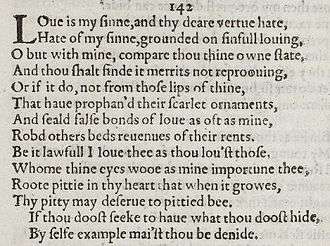Sonnet 142
| Sonnet 142 | |||||||
|---|---|---|---|---|---|---|---|
 Sonnet 142 in the 1609 Quarto | |||||||
|
| |||||||
| |||||||
Sonnet 142 is one of 154 sonnets written by the English playwright and poet William Shakespeare.
Structure
Sonnet 142 is an English or Shakespearean sonnet. The English sonnet has three quatrains, followed by a final rhyming couplet. It follows the typical rhyme scheme of the form abab cdcd efef gg and is composed in iambic pentameter, a type of poetic metre based on five pairs of metrically weak/strong syllabic positions. The 14th line exemplifies a regular iambic pentameter:
× / × / × / × / × / By self-example mayst thou be denied! (142.14)
The 2nd line contains three common metrical variants: an initial reversal, a mid-line reversal, and a final extrametrical syllable or feminine ending:
/ × × / / × × / × /(×) Hate of my sin, grounded on sinful loving: (142.2)
- / = ictus, a metrically strong syllabic position. × = nonictus. (×) = extrametrical syllable.
Line 4 necessarily shares a feminine ending. An initial reversal can also be found in line 1, and potentially in lines 3, 5, 8, and 12; another mid-line reversal can be found in line 5.
The meter demands two variant (and unusual to modern ears) pronunciations: line 8's "revenues" is stressed on the second syllable, and line 9's "Be it" functions as one syllable.[2]
While frequently the rhythm of iambic pentameter lines arises from the implicit emphasis of its words, this sonnet affords several examples of the implicit emphasis of words arising from the meter. For example, in line 9, Shakespeare diverts the ictus away from the two strong tonic stresses of "love" and "lov'st" by arranging the line such that the meter implies contrastive accent on the four pronouns surrounding them:
× / × / × / × / × / Be it lawful I love thee, as thou lov'st those (142.9)
Interpretations
- Sylvia Syms, for the 2002 compilation album, When Love Speaks (EMI)
Notes
- ↑ Pooler, C[harles] Knox, ed. (1918). The Works of Shakespeare: Sonnets. The Arden Shakespeare [1st series]. London: Methuen & Company. OCLC 4770201.
- ↑ Booth 2000, p. 492-93.
References
- First edition and facsimile
- Shakespeare, William (1609). Shake-speares Sonnets: Never Before Imprinted. London: Thomas Thorpe.
- Lee, Sidney, ed. (1905). Shakespeares Sonnets: Being a reproduction in facsimile of the first edition. Oxford: Clarendon Press. OCLC 458829162.
- Variorum editions
- Alden, Raymond Macdonald, ed. (1916). The Sonnets of Shakespeare. Boston: Houghton Mifflin Company. OCLC 234756.
- Rollins, Hyder Edward, ed. (1944). A New Variorum Edition of Shakespeare: The Sonnets [2 Volumes]. Philadelphia: J. B. Lippincott & Co. OCLC 6028485.
- Modern critical editions
- Atkins, Carl D., ed. (2007). Shakespeare's Sonnets: With Three Hundred Years of Commentary. Madison: Fairleigh Dickinson University Press. ISBN 978-0-8386-4163-7. OCLC 86090499.
- Booth, Stephen, ed. (2000) [1st ed. 1977]. Shakespeare's Sonnets (Rev. ed.). New Haven: Yale Nota Bene. ISBN 0-300-01959-9. OCLC 2968040.
- Burrow, Colin, ed. (2002). The Complete Sonnets and Poems. The Oxford Shakespeare. Oxford: Oxford University Press. ISBN 978-0192819338. OCLC 48532938.
- Duncan-Jones, Katherine, ed. (2010) [1st ed. 1997]. Shakespeare's Sonnets. The Arden Shakespeare, Third Series (Rev. ed.). London: Bloomsbury. ISBN 978-1-4080-1797-5. OCLC 755065951.
- Evans, G. Blakemore, ed. (1996). The Sonnets. The New Cambridge Shakespeare. Cambridge: Cambridge University Press. ISBN 978-0521294034. OCLC 32272082.
- Kerrigan, John, ed. (1995) [1st ed. 1986]. The Sonnets ; and, A Lover's Complaint. New Penguin Shakespeare (Rev. ed.). Penguin Books. ISBN 0-14-070732-8. OCLC 15018446.
- Mowat, Barbara A.; Werstine, Paul, eds. (2006). Shakespeare's Sonnets & Poems. Folger Shakespeare Library. New York: Washington Square Press. ISBN 978-0743273282. OCLC 64594469.
- Orgel, Stephen, ed. (2001). The Sonnets. The Pelican Shakespeare (Rev. ed.). New York: Penguin Books. ISBN 978-0140714531. OCLC 46683809.
- Vendler, Helen, ed. (1997). The Art of Shakespeare's Sonnets. Cambridge, MA: The Belknap Press of Harvard University Press. ISBN 0-674-63712-7. OCLC 36806589.
.png)
